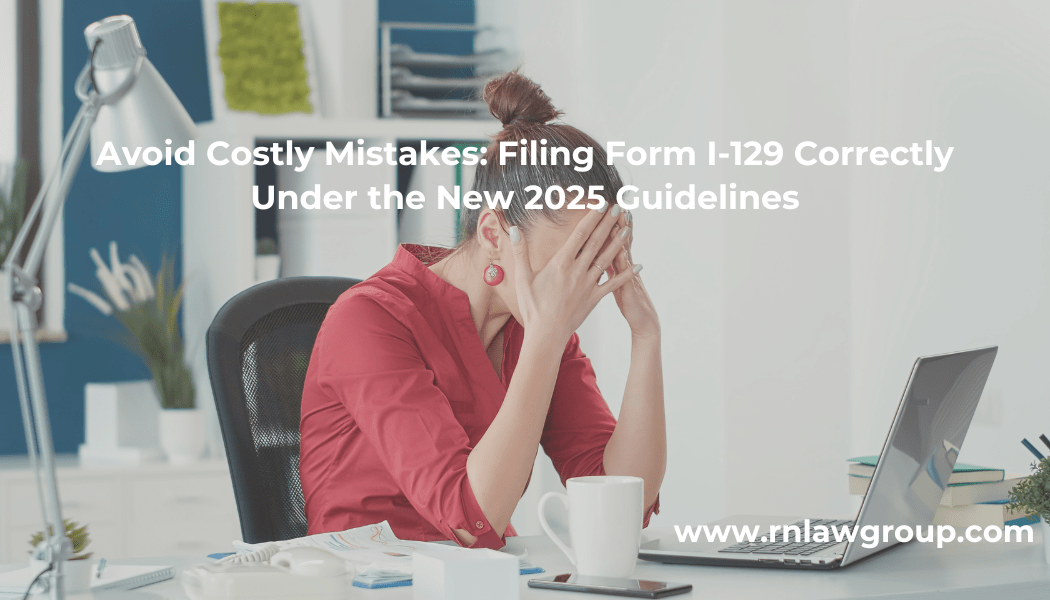
Avoid Costly Mistakes: Filing Form I-129 Correctly Under the New 2025 Guidelines
On January 17, 2025, the U.S. Citizenship and Immigration Services (USCIS) will implement a significant update to Form I-129, Petition for a Nonimmigrant Worker. This revised form, dated 01/17/25, replaces the previous 04/01/24 edition and aligns with the recently announced H-1B and H-2 modernization final rules. Proper compliance with this update is crucial for petitioners to avoid delays, rejections, and unnecessary financial setbacks. This guide provides comprehensive insights to ensure accurate and timely filing under the new guidelines.
Why the Revision Matters
Form I-129 is a cornerstone for employers petitioning on behalf of nonimmigrant workers across classifications like H-1B, H-2A, H-2B, L-1, O-1, and others. These petitions often involve tight timelines and high stakes, as they directly impact business operations and workers’ legal statuses. USCIS has updated this form to enhance clarity, reflect current policies, and align with modernization efforts. Filing the correct version is now more critical than ever, as errors could lead to costly delays or even denied petitions.
Key Changes and Transition Details
- Mandatory Use of the 01/17/25 Edition
Starting January 17, 2025, USCIS will only accept the new edition of Form I-129. Petitions submitted using the outdated 04/01/24 version on or after this date will be rejected without exception. Unlike past updates, there is no grace period for transitioning to the revised form. - Preview Availability
A preview of the updated form and its instructions is already available on the USCIS website. This allows petitioners to familiarize themselves with the changes before the effective date. - Guidelines for Paper Filings
-
- Petitions using the 04/01/24 edition must be received by USCIS before January 17, 2025.
- Petitions received on or after January 17, 2025, must use the 01/17/25 edition.
- Failing to meet these requirements will result in rejection.
Common Mistakes and How to Avoid Them
To avoid costly errors when filing Form I-129 under the new guidelines, follow these best practices:
- Double-Check the Edition Date
Always verify that you are using the 01/17/25 edition. Filing with an outdated version will result in immediate rejection, forcing you to start the process over. - Review Updated Instructions
Carefully read the updated instructions for the revised form. USCIS may have clarified or introduced new requirements, especially regarding supplemental information. - Use the Correct Filing Fees
Ensure you include the correct filing fee amount. Changes in form editions sometimes coincide with fee adjustments. - Provide Accurate Supporting Documentation
Double-check all supporting documents, such as employment contracts, job descriptions, and labor condition applications (LCAs). Discrepancies can lead to delays or denials. - Submit Before Deadlines
If you plan to use the 04/01/24 edition, ensure it is received by USCIS before January 17, 2025. Factor in mailing times and possible delays. - Leverage Legal Expertise
Consulting with an immigration attorney or specialist can help ensure compliance and avoid unnecessary mistakes during the transition.
Implications of Filing Errors
Failure to file with the correct form or adhere to the new guidelines can have significant repercussions:
- Rejected Petitions: USCIS will not process submissions using the outdated form after January 17, 2025.
- Delays in Employment: Rejections may delay start dates for nonimmigrant workers, disrupting business operations.
- Increased Costs: Restarting the process can incur additional costs, including legal fees and potential penalties.
Benefits of the Revised Form
While the transition requires careful attention, the updated Form I-129 offers several benefits:
- Clarity: The new form is designed to reduce ambiguity and make the filing process more straightforward.
- Modernization: Changes align with USCIS’s broader modernization efforts, potentially leading to faster processing times.
- Regulatory Compliance: The updates ensure the form reflects current laws and regulations, reducing the risk of legal challenges.
How to Prepare for the Transition
- Download the Preview Version
Visit the USCIS website to access the preview of the revised Form I-129 and its instructions. Use this opportunity to familiarize yourself with any changes. - Audit Current Petitions
Review any pending or planned petitions to ensure they align with the new guidelines. Prioritize submissions using the old form to meet the January 17 deadline. - Monitor USCIS Updates
Stay informed about additional updates or announcements from USCIS regarding Form I-129 or related processes.
Additional Resources
For further guidance:
- Access the preview version of the revised Form I-129 here.
- Consult the USCIS newsroom for the latest announcements and policy updates.
- Seek advice from a qualified immigration attorney or expert for case-specific concerns.
Conclusion
Adapting to the changes to Form I-129 under the 2025 guidelines requires careful attention, but thorough preparation can help you avoid costly mistakes. By staying informed, using the correct form, and following USCIS’s updated requirements, you can ensure a smooth and successful petition process for nonimmigrant workers. With a clear understanding of the updates and proactive planning, compliance becomes a straightforward and achievable goal.
Reddy Neumann Brown PC located in Houston, Texas, has been serving the business community for over 27 years and is Houston’s largest immigration law firm focused solely on U.S. Employment-based immigration. We work with employers, employees and investors helping them navigate the immigration process quickly and cost-effectively.
By: Jeanetly Garcia
Jeanetly Garcia advises employers and individuals through all phases of the non-immigrant visa process. As an attorney in the H-1B Department at Reddy Neumann Brown PC she is experienced in filing nonimmigrant petitions and applications for immigrant benefits, as well as, responding to USCIS issued requests for evidence concerning an array of legal issues.

